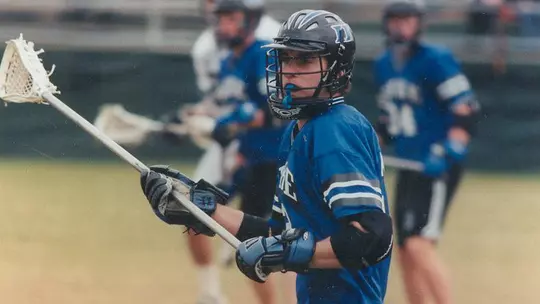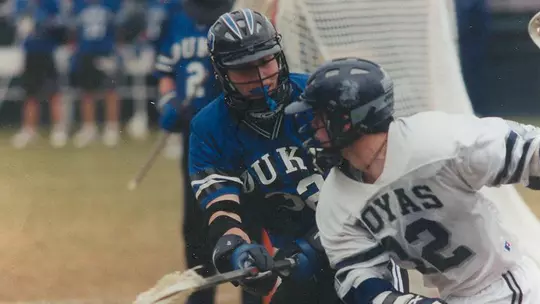
Card Reflects on Relationships and Lessons Learned at Duke
Rarely will one be the smartest person in a room, the most athletic one on a field or court and that is perfectly alright. It’s about how you use the skills already in your repertoire and your ability to work with others that can ultimately help determine success or failure.
Former Duke All-American defenseman Stephen Card will attest to this, from his time as a Blue Devil to his early professional life, and what he now teaches his own children and looks for when hiring young people entering his field of real estate.
In his second year as the Principal and Director of Investments for Rubenstein Partners, a private equity real estate firm he has been with for 13 years, Card has used the daily lessons he learned from his head coach Mike Pressler, assistant coach Joe Alberici and teammates to launch his success.
“I think whether it’s lacrosse or any team environment and specifically the environment at Duke under Coach Pressler and Coach Alberici – the lessons you learn in terms of having to deal with others and the work ethic they instilled in you [impact you every day],” said Card. “I’ve kind of brought that into my professional life from day one.”
Hailing from Princeton, N.J., Card arrived at Duke in the fall of 1996. He spent his first season in 1997 learning from [SS1] a trio of talented senior defensemen as the Blue Devils put together the best season in program history, including its first final four appearance.
Despite not being on the field during his rookie campaign, that year brought one of the greatest memories of the four years and a lifelong lesson of the importance of building relationships.
Featuring a superb senior class and seven All-Americans on the roster, Duke made history when it took down Johns Hopkins, 12-11, in overtime at Byrd Stadium in College Park, Md. While the game was memorable – one he said they had no business winning and should’ve lost – it is the euphoric feeling in the locker room with his teammates he remembers best.
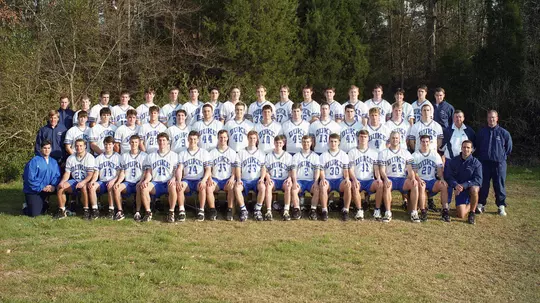
“We should have lost that game 10 times in a row the way it played out,” Card said. “We were down by two late, Hopkins gave up the ball and we ended up winning in overtime. I’ll never forget singing [Take Me Home, Country Roads] in the locker room afterwards. I’ll never ever forget that team. That team was special and as freshmen, we had a very close relationship with the senior class that year and that was the way Coach Pressler recruited.”
The memories made and leadership cues learned from the senior class in 1997 left a lasting impression – that it was and will always be about the relationships. As he set out to become a leader on and off the field, he put an emphasis on relationships and building a team-first culture.
The following season, his first as a starter, he earned third team All-America honors and in 1999, the Lawrenceville School product became the sixth Blue Devil defenseman to garner first-team All-America recognition. Remembered as a talented takeaway artist on a stalwart defense, he repeated the honor in 2000 to become only the second defenseman in Duke history to capture two first-team awards and one of three overall to do so in the 81-year history of the program.
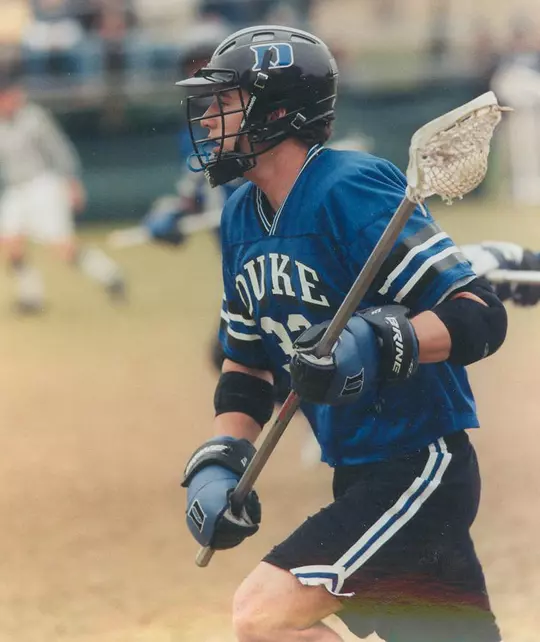
His lacrosse career was bookended by another lacrosse memory – this time on the field – as the Blue Devils took down North Carolina in commanding fashion at Koskinen his senior year. It wasn’t a close game, making it unlike any other “big” victory throughout his career in his mind.
He remembers the 2000 squad being an overachieving group as it battled to an 11-5 record with eight of the 16 games decided by two or fewer goals. However, one game that was never in doubt was the win over the Tar Heels.
“We came in having lost a couple tough games and we beat Carolina at home under the lights,” Card said. “I’ll never forget – and the guys always joke because I was never a big hitter – but I made a big play at midfield. It was a bang-bang play where I made a big hit and picked up the ball and fired a 40-yard pass to TJ Durnan right on the doorstep and he scored. It was one of the only wins I can remember where we felt comfortable in the last few minutes and for it to be against Carolina my senior year and for us as a senior class – we were all very close – on our home turf was very special.”
Card graduated from Duke in May of 2000 after helping Duke to a 47-16 four-year record and anchoring the defense for three seasons. He jumped into his job as an analyst at Merrill Lynch that summer. Possessing a diverse set of tools in his toolbox thanks to his time at Duke, Card however did not immediately excel at using them.
“You don’t realize as much coming right out of college,” said Card of the benefit of the many lessons learned at Duke had. “You come out and get into your work life and you’re kind of drinking from the fire hose, collecting a paycheck and going on your way.”
However, just like he did at Duke, he quickly thrived through his work ethic and grit as well as his ability to problem solve and overcome the daily challenges presented to him. He worked for two years at Merrill Lynch before becoming an associate at Catterton Partners, an American private equity company, where he worked for three years.
Card returned to the classroom in 2005 at the Wharton Business School and earned his MBA in 2007. After one year as a senior associate at Starwood Capital Group, Card joined Rubenstein Partners, working his way into his current role.
When looking back on his path after Duke, he sees so many similarities between his time on the lacrosse field and in the business world.
“[As a collegiate athlete] you always have that experience and grit of working through that level of intensity, and the challenges you face on a day-to-day and hour-to-hour basis,” Card said. “The physical intensity and the mental intensity you have to carry through day-to-day to get through the daily challenges of problem solving and working with people who are challenging and leading teams. I credit almost 100 percent [my navigating those challenges professionally] to the teaching and leadership I got from my coaches and my peers on the athletic fields, primarily at Duke.”
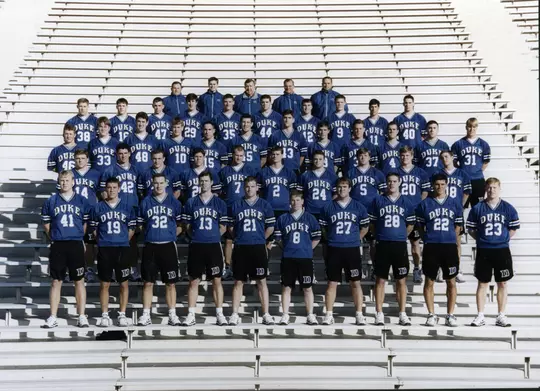
Now with 20 years of postgraduate experience under his belt, Card is taking what he learned from Pressler and his teammates and using it today as he molds future professionals in the real estate market.
“Coach Pressler wanted raw athletes,” Card said. “For him it was character, athletic ability and lacrosse skill in that order. And again – parallel to the professional world, I want that as well. I don’t care if the 21-year-old kid coming out of college knows how to value an office building. That doesn’t mean anything to me, because I am going to train that person to do what they need to do. So, it’s going to be can they be a good teammate, can they listen, do they have good leadership qualities, and do they have the raw skills? Lastly, are they good real estate investors? If you recruit the latter first, you may have good players and maybe you can [be successful], but do you have a good team?”
Card saw firsthand how a successful team and a good culture go hand-in-hand. He remembers the inside joke about his defensive group being tough, but maybe not the best catchers and throwers. However, the culture that existed within the team was second to none and fueled their success.
“That is one thing I always will remember about Duke,” Card said. “It was always about the relationships. I never won a championship – ACC or national championship and that stings even today – but I would never go back and change anything about my experience lacrosse wise because of the relationships.”
Those bonds are as strong today as they were 20-plus years ago and he’s been able to develop more with younger Blue Devils thanks to the shared values of being a Duke lacrosse player or as current head coach John Danowski puts it – a Duke Man.
“Coach Danowski has done a great job of bridging the two communities [those players from before Danowski was hired in 2006 and the more recent players] and I give him a ton of credit for that,” Card said. “It’s funny that despite Pressler and Danowski being two totally different people and coaching styles, how even 20 years apart the kids are almost the same. It’s remarkable and it’s great to see.”
Meanwhile, until Card and his class from 2000 can return to campus as a group after missing their 20-year reunion due to the COVID-19 pandemic, he will settle for the group texts and emails about everything from memories of Duke to family photos and even business ventures.
“Unfortunately, due to life we don’t get to see each other a lot, but I’m scrolling through my phone and I have five or six separate text chains from the last week alone with different subsets of Duke lacrosse guys,” Card said. “It’s all nonsense too and it’s all good nonsense. Funny pictures from 20 years ago, stuff going on today and pictures of kids. In fact, I just got an email from one of my classmates who is in the real estate industry about business this morning. You have connections that can be helpful in business and just lifelong connections that will not be severed.”
